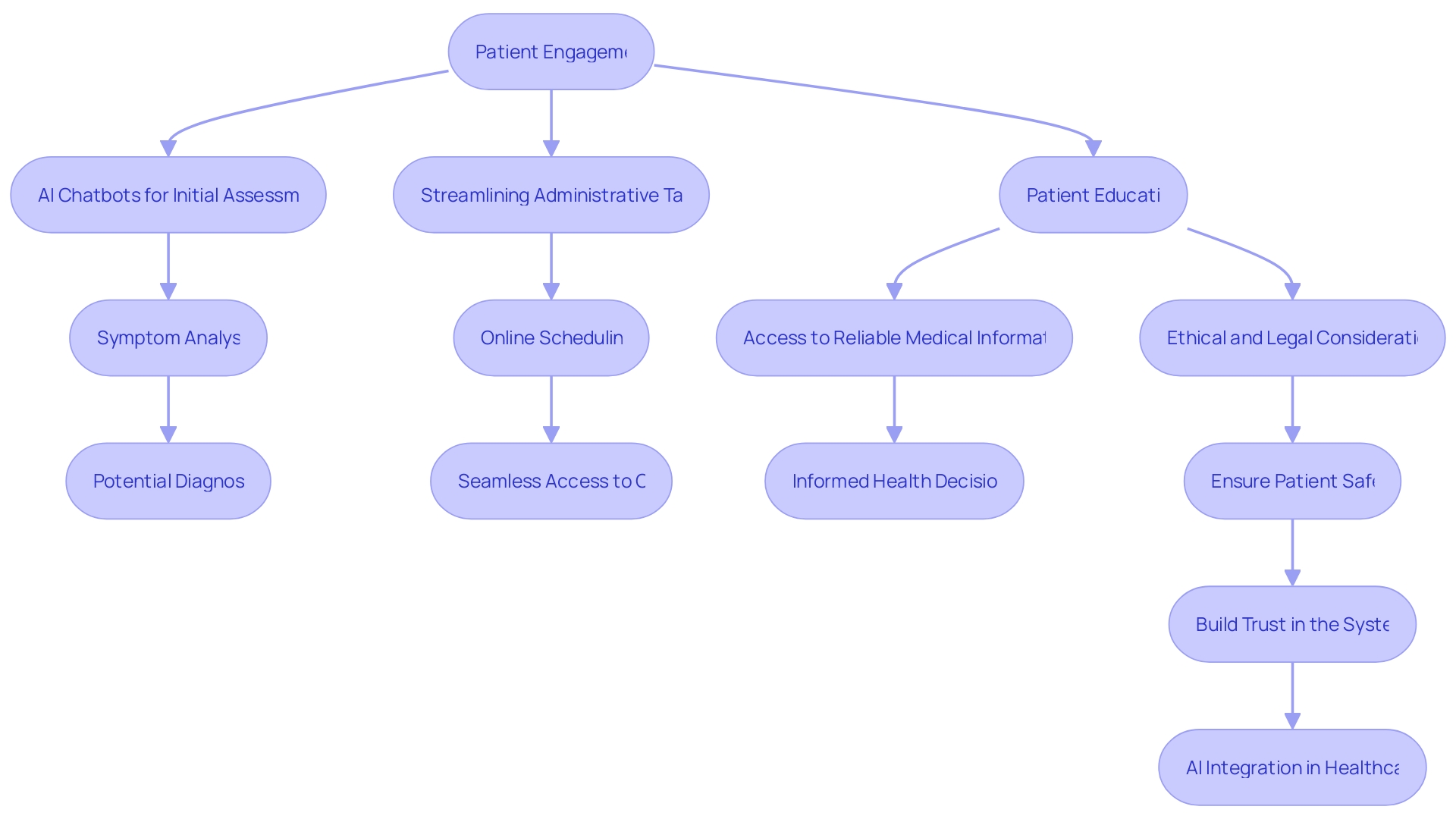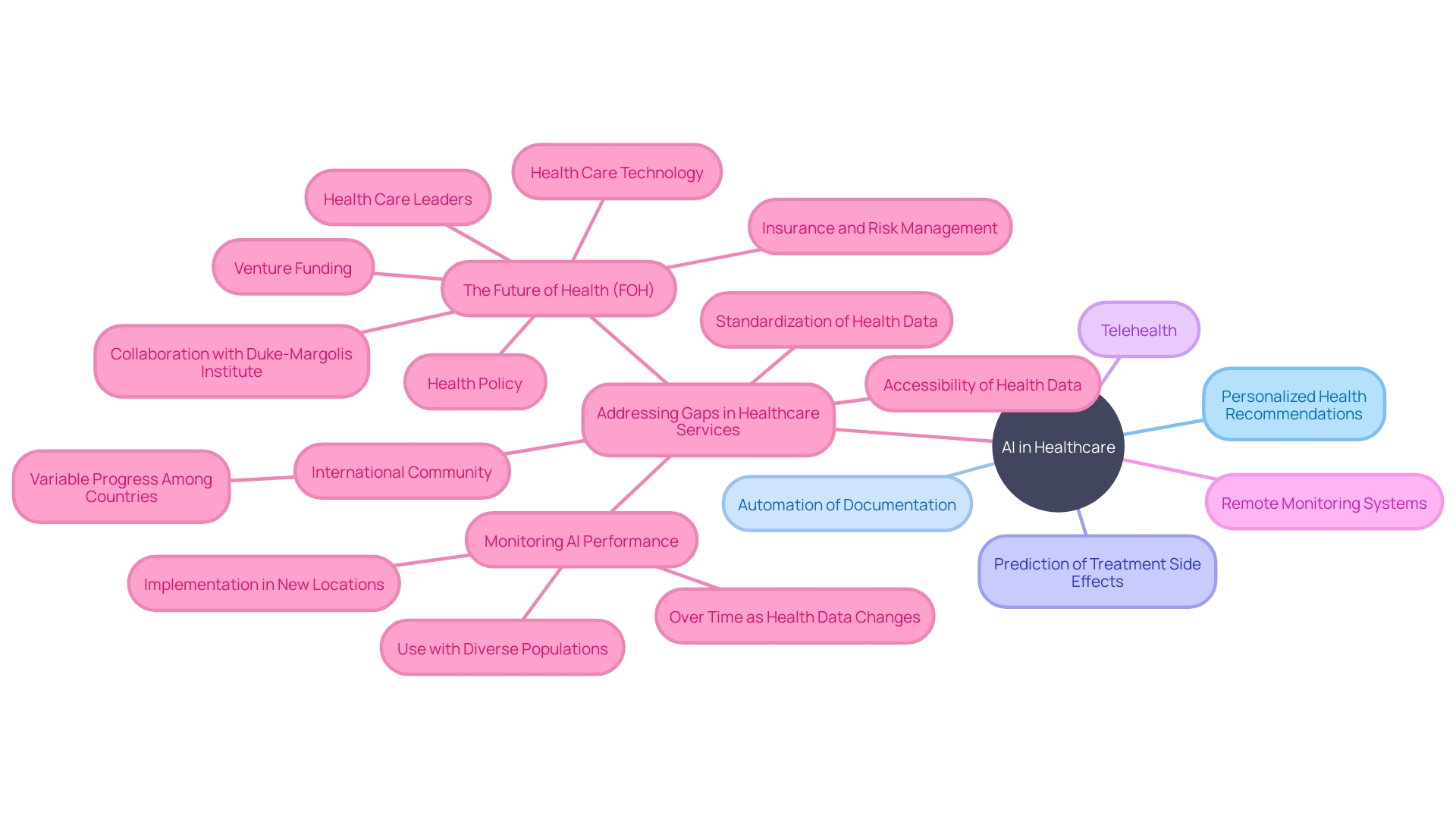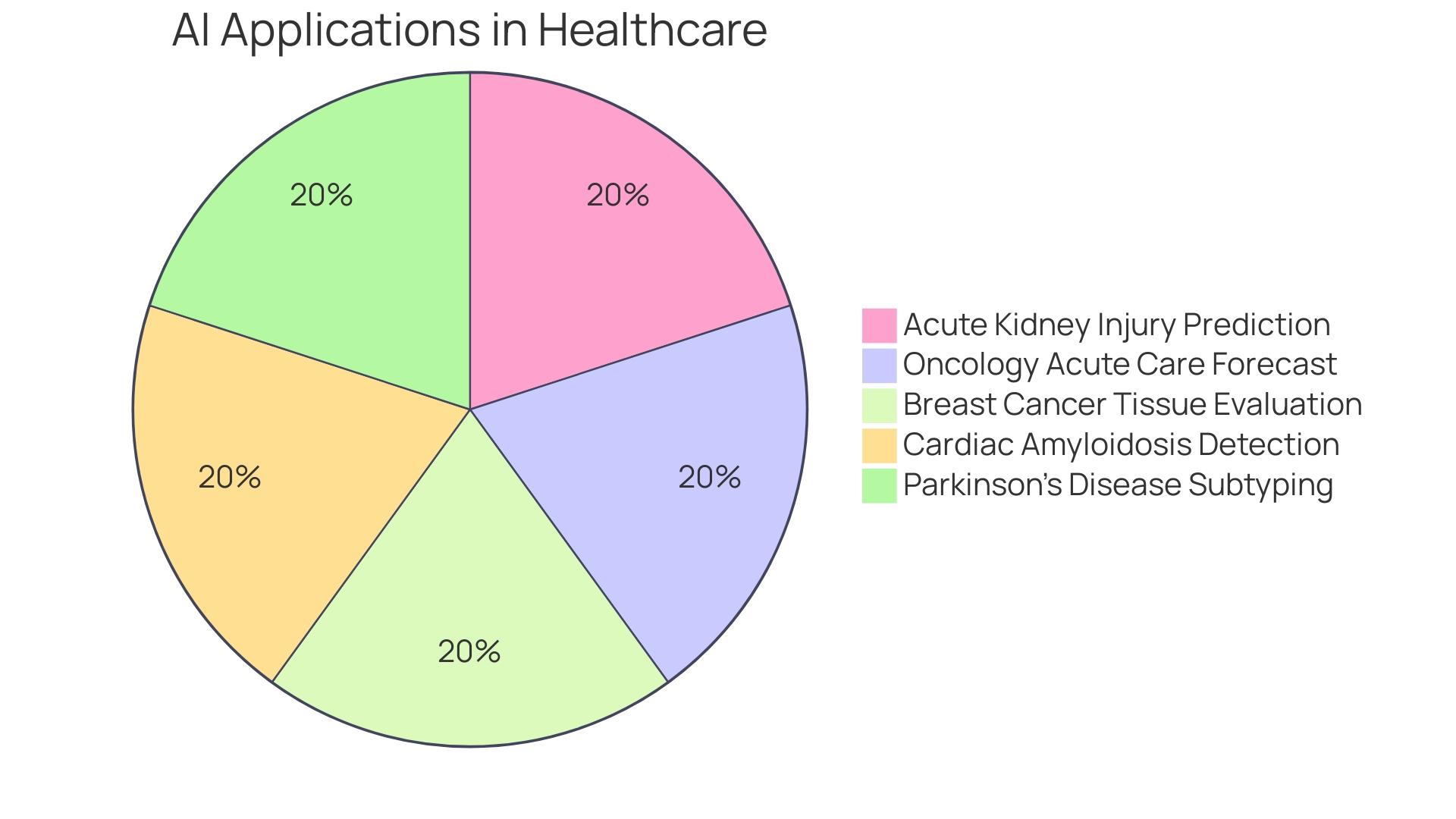Introduction
Harnessing the power of artificial intelligence (AI) in healthcare is transforming the way we approach medical diagnostics. With AI algorithms, healthcare professionals can sift through extensive medical imaging data with precision and speed.
These AI-driven tools are already making an impact in fields like dermatology, assisting in the identification of skin diseases, including cancer. But AI in healthcare goes beyond image analysis, as advanced language models enable the processing of clinical histories for enhanced diagnostic accuracy.
The potential benefits of AI in healthcare are vast, from streamlining drug discovery to developing personalized treatment plans. However, implementing AI in healthcare comes with challenges that must be addressed to ensure safe and ethical application. In this article, we will explore the impact of AI on healthcare and its potential to revolutionize patient care and healthcare management.
Enhanced Diagnosis and Early Detection
Harnessing the power of artificial intelligence (AI) in healthcare is transforming the way we approach medical diagnostics. By integrating AI algorithms, healthcare professionals can sift through extensive medical imaging data with remarkable precision and speed.
Such AI-driven tools are already making an impact in fields like dermatology, where computers trained on massive datasets of skin images are assisting in the identification of skin diseases, including cancer. These algorithms complement the expertise of clinicians, who can confirm or reject the Ai's suggestions, ensuring a collaborative approach to patient care.
Moreover, these AI systems are not limited to image analysis. The advent of advanced language models like GPT-4 enables the processing of clinical histories, which can be particularly valuable in regions with scarce specialist care.
By analyzing textual data, these models aid in diagnosing complex and delayed cases, enhancing diagnostic accuracy. The potential benefits of AI in healthcare are vast, as evidenced by its role in streamlining drug discovery and developing personalized treatment plans.
Ai's ability to analyze genetic, historical, and lifestyle data can lead to more effective and side-effect-free treatment regimens, tailored to individual patients. Nevertheless, the implementation of AI in healthcare comes with its challenges. The training data must be unbiased to prevent skewed outcomes, and the 'black box' nature of AI algorithms necessitates transparency for clinician trust. As AI continues to evolve, clear regulations are imperative to ensure its safe, effective, and ethical application in healthcare settings. Amidst the excitement and skepticism surrounding AI, it's crucial to engage in evidence-based debates. As AI applications in healthcare progress, they promise to enhance disease prediction, diagnostics, and treatment, potentially revolutionizing patient care and healthcare management.
Personalized Treatment Plans
Harnessing the power of artificial intelligence (AI) in healthcare, we are now able to move beyond one-size-fits-all treatment approaches. AI algorithms, through genomic sequencing and machine learning, are revolutionizing how we provide care by focusing on the individual characteristics of each patient.
For example, AI-driven genomic sequencing can pinpoint effective cancer treatments tailored to a patient's unique genetic profile, while machine learning models can forecast the likelihood of diseases like diabetes or heart conditions, enabling early, personalized intervention. The TRUST project exemplifies this shift, utilizing deep phenotyping to refine treatment decisions, and the recent publication in Nature about an AI model that aligns with medical consensus further emphasizes the potential of AI in healthcare.
However, as Harvey Castro, a physician and healthcare consultant, reminds us, technology will not replace healthcare professionals but will instead augment their capacity to offer individualized care. This blend of AI and personalized medicine marks a transformative step towards a healthcare model that's more precise, predictive, and preventive. As we embrace this advancement, the benefits for patient outcomes and healthcare efficiency are immense, provided we also address the challenges of data standardization and accessibility, as highlighted by the Future of Health community. In the pursuit of personalized care, AI is not just a technological breakthrough—it's the foundation for a more nuanced, patient-centric healthcare paradigm.
Streamlined Administrative Tasks
The integration of AI in healthcare is transforming patient engagement and streamlining administrative tasks. Notably, AI-powered chatbots are redefining how patients interact with their healthcare providers. For instance, chatbots equipped with natural language processing capabilities are now capable of conducting initial medical assessments.
They can understand the varied ways patients describe their symptoms, analyze this information, and suggest potential diagnoses. This not only empowers patients with valuable health insights but also reduces unnecessary clinical visits. A significant shift towards digital tools has been observed, with patients preferring online mechanisms for tasks like scheduling appointments.
Despite this, many face the inconvenience of being redirected from online scheduling to overburdened call centers. AI advancements aim to address this by providing a seamless digital experience. As cited by the Chief Medical Officer at Notable, 'Notable Assistant' allows patients to navigate healthcare services using their native language, without the need for phone calls, thus easing access to care.
Furthermore, AI is making strides in patient education, enabling individuals to access reliable medical information and make informed health decisions. The NHS's adoption of WhatsApp and AI for scheduling exemplifies the potential to enhance disease detection and patient survival while alleviating operational inefficiencies. However, as healthcare professionals integrate these technologies, ethical and legal considerations must be defined to ensure patient safety and trust in the system.

Improved Patient Engagement
The intersection of AI technology with healthcare is transforming the patient experience, making it more personalized and proactive. For instance, mobile apps and wearable devices are not just tracking vital signs; they have evolved into intelligent assistants providing personalized health recommendations. This shift is exemplified by innovative AI applications that allow clinicians to focus more on the patient by automating documentation processes.
Dr. Christopher Sharp, a chief medical information officer, observed significant benefits from using AI to capture patient conversations, which enabled him to truly listen without the distraction of note-taking. This sentiment is echoed at Stanford Health Care, where Ai's integration has saved time for 78% of physicians in the pilot program and streamlined clinical note-taking. Moreover, the potential of AI in healthcare is further highlighted by its role in predicting treatment side effects.
For example, an AI tool developed by an international team, including Dr. Tim Rattay, is being trialed to forecast the likelihood of patients experiencing chronic conditions post-treatment, like lymphoedema after breast cancer therapy. This predictive capability paves the way for more personalized care plans and informed decision-making. These advancements reflect a broader trend towards leveraging big data and AI in healthcare decision-making.
The rise of telehealth and sophisticated remote monitoring systems exemplify the drive towards more comprehensive care options beyond the traditional healthcare setting. As these technologies continue to evolve, they not only enhance patient well-being but also address critical gaps in healthcare services, such as mental health support. The future of healthcare is undeniably intertwined with the advancement of AI, promising a more efficient, patient-centered approach to care.

Enhanced Data Analysis
Advanced analytics in healthcare, particularly AI, has the capability to revolutionize patient care by scrutinizing extensive health data to unearth critical insights. One striking example is the University Hospitals of Leicester (UHL) team's AI model, which is adept at pinpointing patients unlikely to develop Acute Kidney Injury (AKI) using a dataset with only a 1.5% incidence rate.
This precision highlights Ai's potential in enhancing treatment strategies and disease management. In oncology, Ronin's AI system epitomizes innovation by forecasting acute care needs, thereby averting emergency department visits and optimizing clinical outcomes.
This system underscores the importance of safety, equity, interpretability, and constant performance monitoring in AI tools. Furthermore, AI is making strides in diseases with high societal impact.
For breast cancer, which affects one in eight U.S. women, AI models now evaluate tissue samples considering both cancerous and non-cancerous cells, providing a more comprehensive approach to grading than traditional methods. Similarly, AI has proven instrumental in the early detection of cardiac amyloidosis, a grave illness, by analyzing scintigraphy images from a vast patient dataset.
It's also carving a path for personalized medicine in Parkinson's disease by accurately predicting disease subtypes from stem cell images, with one model achieving a 95% accuracy rate. These advancements, however, hinge on the availability of standardized, accessible health data—a challenge recognized by the Future of Health (FOH) and the Duke-Margolis Institute for Health Policy. Their collaborative effort engaged 46 healthcare leaders across 11 countries to address the need for international data standardization and the vigilant monitoring of AI tool performance. This is vital to mitigate algorithm bias, which can lead to misrepresentations and adverse patient outcomes if left unchecked. The collective goal is clear: to harness Ai's full potential in healthcare by ensuring inclusive, accurate, and reliable data that benefits all individuals equally.

Reduced Medical Errors
Artificial intelligence (AI) has the potential to augment healthcare professionals' decision-making capabilities, particularly in the rapid and accurate diagnosis of conditions like sepsis. SepsisLab, a novel AI system, exemplifies this by predicting a patient's sepsis risk and suggesting the top five lab tests to reduce diagnostic uncertainty. By offering counterfactual predictions, it allows clinicians to assess how different lab results could affect a patient's diagnosis before tests are conducted.
This proactive approach could substantially enhance diagnostic precision and patient outcomes. The healthcare industry is already witnessing Ai's positive impact, as demonstrated by Kaiser Permanente's AI tool, which has been instrumental in detecting early signs of clinical deterioration. This tool has been crucial for over a decade, improving patient care quality and saving lives by enabling timely interventions.
With Ai's continued development, it promises to revolutionize patient care further. However, challenges such as alert fatigue and ethical considerations must be addressed. The healthcare community is concerned about the potential for AI to induce complacency or over-reliance, as seen in cases where biases in AI algorithms have led to diagnostic inaccuracies.
Therefore, integrating AI into healthcare demands rigorous validation, continuous monitoring, and collaborative design with patients and clinicians to ensure its benefits are fully realized without compromising patient safety. As the healthcare landscape evolves with AI, studies like the one from Chalmers University of Technology, which leveraged mathematical models to improve patient triage in ambulance care, underscore the importance of AI in enhancing decision-making processes. These advancements show a promising future where AI not only supports healthcare professionals but also contributes to more efficient resource utilization and better patient outcomes.
Conclusion
In conclusion, the integration of artificial intelligence (AI) in healthcare has the potential to revolutionize patient care and healthcare management. AI algorithms are already enhancing medical diagnostics by analyzing extensive medical imaging data and processing clinical histories with precision and speed.
These AI-driven tools complement the expertise of healthcare professionals, leading to enhanced diagnostic accuracy in fields like dermatology and personalized treatment plans based on individual characteristics. The benefits of AI in healthcare extend beyond diagnostics and treatment.
It streamlines administrative tasks through AI-powered chatbots, providing patients with valuable health insights and reducing unnecessary clinical visits. AI also improves patient engagement by automating documentation processes, predicting treatment side effects, and enabling personalized health recommendations through mobile apps and wearable devices.
Furthermore, advanced analytics in healthcare, particularly AI, allows for enhanced data analysis that uncovers critical insights for better treatment strategies and disease management. However, challenges such as unbiased training data, algorithm transparency, ethical considerations, data standardization, and accessibility must be addressed to ensure safe and ethical implementation of AI in healthcare. As we navigate the exciting potential of AI in healthcare, evidence-based debates are crucial. The future of healthcare lies in harnessing the full potential of AI while ensuring patient safety, trust in the system, inclusivity, accurate data representation, and reliable performance monitoring. By doing so, we can embrace a more precise, predictive, preventive, patient-centric approach to care that leads to improved outcomes for all individuals.





